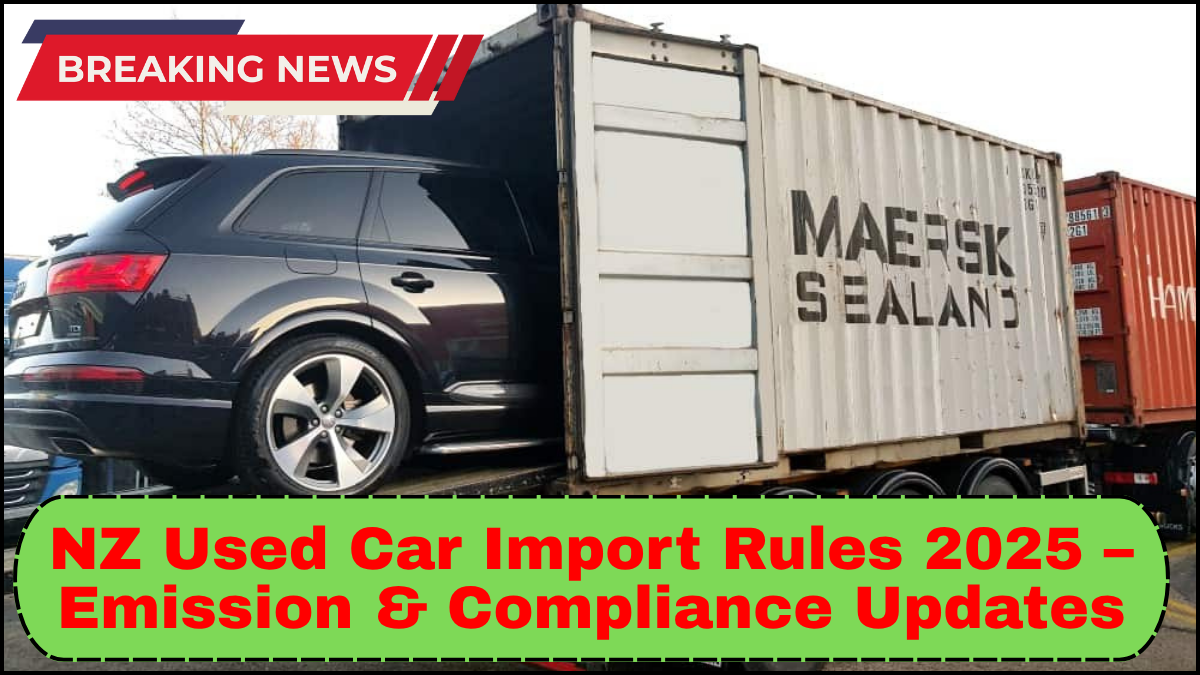In 2025, New Zealand is tightening its regulations on second-hand vehicle imports in an effort to align with climate goals and promote road safety. The updated NZ Used Car Import Rules 2025 introduce stricter emission standards and enhanced compliance checks, directly impacting car dealers, importers, and buyers alike.
Below, we break down the most critical updates, their implications, and what you need to know if you plan to import a used vehicle into New Zealand.

Stricter Emission Standards in 2025
The cornerstone of the 2025 updates is the enforcement of tougher emission standards for all imported used vehicles. This move is part of the government’s broader climate strategy to reduce transport-related emissions.
From January 1, 2025, all used petrol vehicles imported into New Zealand must meet at least the Euro 5 standard, while used diesel vehicles must comply with Euro 6. These European standards regulate the amount of harmful gases vehicles can emit, including carbon monoxide (CO), nitrogen oxides (NOx), and particulate matter.
Key points:
- Petrol vehicles must comply with Euro 5 or above.
- Diesel vehicles must meet Euro 6 emission standards.
- Non-compliant vehicles will be denied entry.
Electric and Hybrid Vehicle Exceptions
To encourage greener transport options, electric vehicles (EVs) and hybrid cars will enjoy more lenient import rules. While EVs are exempt from emissions testing, hybrid models still need to meet minimum compliance requirements. However, the thresholds are less stringent compared to traditional internal combustion engines.
Compliance Inspection Enhancements
The NZTA (New Zealand Transport Agency) has upgraded its compliance inspection protocols for 2025. All second-hand vehicles imported to NZ must undergo a more detailed structural and safety inspection.
New updates include:
- Electronic stability control (ESC) is mandatory for all used imports.
- Advanced driver-assistance systems (ADAS) will be inspected if the vehicle is equipped.
- Vehicles must pass frontal impact standards specific to New Zealand regulations.
Age Limits and Odometer Integrity
To maintain the quality and safety of used vehicles on NZ roads, the 2025 rules enforce a more stringent age limit policy. Passenger cars older than 8 years will be scrutinized more heavily, especially concerning odometer tampering and overall condition.
Importers must now:
- Provide verified odometer readings.
- Prove roadworthiness with an overseas inspection certificate.
- Ensure that vehicles older than 8 years meet enhanced safety and emission checks.
Biofuel and Alternative Fuel Vehicles
The 2025 regulations also introduce new standards for biofuel-capable and alternative fuel vehicles. These models must disclose engine compatibility and fuel type clearly. Importers are encouraged to declare and certify the fuel system upfront to avoid delays at the border.
Impact on Importers and Car Dealers
Dealers and importers need to recalibrate their sourcing strategies. Sourcing vehicles that meet the new compliance benchmarks may reduce inventory options, but it enhances quality and environmental responsibility.
Suggestions for importers:
- Source vehicles directly from countries with high emission standards like Japan or Europe.
- Partner with compliance centers in NZ for pre-inspection services.
- Maintain thorough documentation for every imported unit.
Preparing for the Change
If you’re a buyer planning to purchase a second-hand vehicle import in NZ, expect slightly higher prices due to increased inspection and compliance costs. However, these costs reflect better environmental standards and safer, higher-quality vehicles on the road.
Checklist for Importers:
- Confirm Euro 5 (petrol) or Euro 6 (diesel) compliance.
- Ensure ESC and ADAS features are functional.
- Obtain verified odometer and structural integrity reports.
Frequently Asked Questions (FAQ)
Q1: Can I still import a vehicle that doesn’t meet Euro 5/6 standards?
No. Vehicles that do not meet the 2025 emission standards will be rejected at entry, unless they qualify under special exemptions (e.g., classic cars).
Q2: What if I want to import an EV or hybrid?
EVs are exempt from emission testing. Hybrids must meet the lower compliance thresholds but are still subject to structural and safety inspections.
Q3: Are there penalties for non-compliance?
Yes. Importers who attempt to bring in non-compliant vehicles may face fines, and the vehicles will be re-exported or destroyed at the owner’s expense.
Q4: How do I check if a vehicle is compliant before import?
Check the vehicle’s emission certification, manufacturing year, and country of origin. It’s advisable to use an NZTA-approved compliance center for verification.
click here to learn more